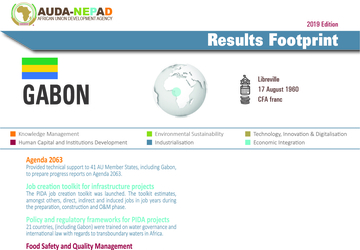 Gabon
Gabon
Official Name: Gabonese Republic
Capital: Libreville
Independence Day: 17 August 1960
Currency: CFA franc
Key Result
Gabon is expected to benefit from the Central African Interconnection Transmission Line Project, which involves the construction of a 3,800 km transmission line system made up of four segments.
Comprehensive information on science, technology and innovation (STI) has been captured and consequently in-country capacity has been built to collect, analyse & publish data and innovation on research & development (R&D) and Innovation.
The Biosciences eastern and central Africa-International Livestock Research Institute (BecAILRI)Hubhas been established as a shared agricultural research and biosciences platform to increase access to world class laboratories for African and international scientists conducting research on African agricultural challenges.
Gabon signed the CAADP Compact in May 2013 committing to prioritise agricultural transformation and development. Technical experts were deployed by the NEPAD Agency to undertake independent technical reviews of its National Agricultural Investment Plans (NAIP).
A conceptual framework and an outline of trade certification scheme for shrimp was developed. The certification scheme will be tested in aquaculture products. The scheme will pilot the African Eco Labelling Mechanism Eco Mark, developed by the African Regional Standard Office (ARSO).
According to the CAADP Biennial Report Review, the progress made is evidenced by: 71% for CAADP completion process, 51.1 of agriculture land under sustainable land management practices, 16.7% annual growth of the agriculture value added (agricultural GDP), 3% prevalence of stunting among children under 5 years old, and 16% increase of agricultural value added per arable land.
A study was undertaken and a report published on the state of the environment of seven countries – including Gabon. The report specifically highlights the state of mangrove swamps and coasts in Western Africa and Central Africa.
Related
Projects

A critical AU Model Law aimed at harmonizing medical products regulatory systems in Africa was endorsed by African Heads of State and Government at the January 2016 AU Summit in Addis Ababa, Ethiopia. The AU Model Law will contribute towards accelerate the regulation of safe, quality and affordable medical products and technologies in Gabon.
Central Africa has embarked on a collaborative framework that will stipulate the activities, roles and responsibilities for implementing an MRH programme in the region. Gabon is participating in a mapping exercise in 2016 that shall establish regulatory systems that will guide ECCAS and OCEAC Member States in setting up an MRH programme.

CAADP Compact: Gabon signed the CAADP Compact on 9 – 10 May 2013 with the aim of transforming agriculture through food & nutrition security, wealth creation, and economic growth to ensure prosperity for all.
Capacity Building: Technical experts were deployed to Gabon to undertake independent technical reviews of its National Agricultural Investment Plans (NAIP).
Business: A CAADP Business meeting is planned for November 2015.
CAADP Compact signed : 9-10 May 2013;
The country received expert support on preparing the National Agriculture Investment Plan.

Project : TAH programme
Description : This is phase I of the continental connectivity programme that focuses on completion and standardisation of the TAH missing links by 2030
Project : Single African Sky phase 1 (design and initial implementation)
Description : Single African Sky is a continental programme that will create a high-level, satellite-based air navigation system for the African continent
Project : Yamoussoukro Decision implementation
Description : Accelerate Yamoussoukro Decision implementation by identifying countries that are ready to fully implement it, and discussing and agreeing with both their governments and airlines to launch the voluntary club on a full membership basis
Project : Central African Interconnection
Description : 3,800 km line from the DRC to South Africa through Angola, Gabon, Namibia and to the north to Equatorial Guinea, Cameroon and Chad
Project : Central African Inter-Capital Connectivity
Description : This programme is specially designed for Central Africa, where one of the key issues for regional integration is the missing links in several intercapital connectors
Project : Central Africa Hub Port and Rail Programme
Description : This programme aims at responding to the future capacity problems in Central African ports. This programme has two components : (a) a regional hub port and rail linkage master plan and (b) port expansion
Project : Douala Bangui Ndjamena Corridor Road – Rail Project (DFS)
Description : The creation of a railway link will speed up regional integration.
Project : ICT Enabling Environment
Description : This programme would improve the environment for the private sectors to invest in high-speed broadband infrastructure
Project : ICT Terrestrial for Connectivity
Description : This programme has two main components : secure each country connection by at least two broadband infrastructure and ensure the access to submarine cable to all landlocked countries
Project : Internet Exchange Point (IXP) programme
Description : The aim of this programme is to provide Africa with adequate internet node exchange to maximise internal traffic


ASTI has captured comprehensive information on STI and consequently built in-country capacity to collect, analyse & publish data and information on research & development (R&D) and Innovation

Results (2013 – 2015)
Advocacy and Strengthening of Negotiation Capacities on Post-2015 Development Agenda through the Common African Position (CAP):
• The multi-stakeholder framework of engagement specifically enhanced dialogue towards ensuring the required mass to influence the Post-2015 Global Agenda and Development Goals relevant to the Continent;
• This intervention helped strengthen country and regional level negotiating capacities for the effective incorporation and articulation of Africa’s priorities as enshrined in CAP in the final Global SDGs;
• The project enabled the participation of African stakeholders at the Means of Implementation Engagement, 3rd Financing for Development Conference and the UN General Assembly that adopted the new SDGs. This ensured the incorporation of Africa’s development priorities into the new goals through developing essential negotiation capacities;
• Through the CAP/SDGs space on the Africa Platform for Development Effectiveness (APDev), knowledge products and negotiation documents, as well as, policy briefs where successfully disseminated to the African negotiators in New York and kept the continent’s stakeholders informed of the overall process;
• Development and dissemination of post-2015 Policy Briefs on “Financing and Partnerships” and “Structural Economic Transformation and Inclusive Growth”. These are priorities outlined in the CAP and the policy briefs where utilized in the negotiation process for the African continent.
Global Partnership for Effective Development Cooperation (GPEDC):
• Africa secured the hosting of the 2nd High Level Meeting (HLM) of the Global Partnership. This was attained through robust negotiation and facilitating a common voice from Africa with regards to this critical engagement by the NEPAD Agency. The 2nd HLM will be held in Nairobi Kenya;
• The NEPAD Agency advocated for the full inclusion and participation of Africa’s Regional Economic Communities (RECs) in conducting the 2nd GP Monitoring Exercise. This was a fundamental achievement considering the RECs are the continent’s building blocks with regards to socio-economic transformation;
• The Africa Action Plan on Development Effectiveness (AAP) was granted the status of an official Global Partnership Initiative (GPI) at the Planning Meeting in Brussels. The AAP was developed by the NEPAD Agency in consultation with African multi stakeholders. This has enabled the Agency to successfully mobilize resources towards the implementation of the AAP.

Project : Transmission – Central African Interconnection Transmission Line Project
Countries/Region : Nigeria, Cameroon, DRC, Angola, Gabon (for first four segments of the transmission line), Equatorial Guinea, Chad, (if the Project is extended) | West, Central, Southern Africa
Project Location : Transmission line spanning West, Central and Southern Africa
Sector/Subsector : Energy/Transmission
Project Description : Construction of a 3,800 km transmission line system made up of four segments

Description : The use of political gravitas and goodwill to unblock and facilitate political bottlenecks affecting the implementation of ICT broadband and optic fibre projects on the continent

you agree to the AUDA-NEPAD Privacy Policy.



